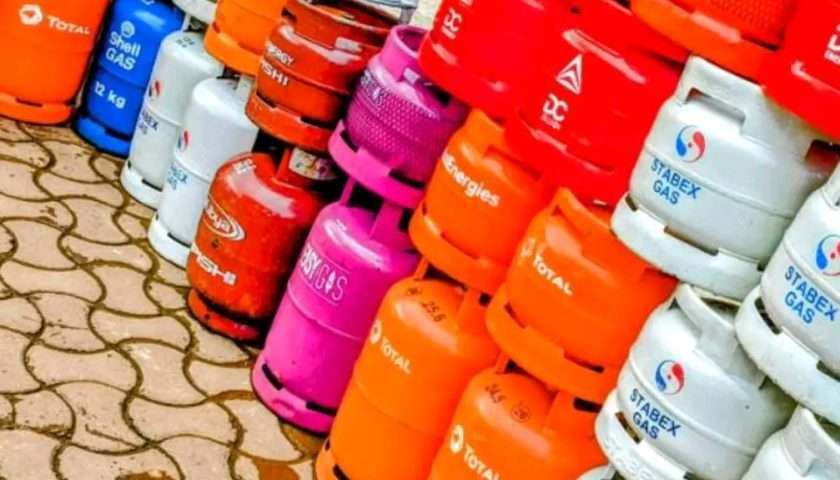Gas safety in homes is essential as more households embrace gas stoves for cooking. While gas is convenient and time-saving, improper handling can lead to dangerous leaks, fires, and explosions. Over the years, several gas-related accidents have occurred in Uganda, often due to poor storage, faulty installations, or unnoticed leaks.
In February 2020, a fire engulfed an entire structure reportedly housing up to 60 gas cylinders in Kikulu Zone, Kikaya-Kisasi, a Kampala suburb. The blaze, believed to have started from a charcoal stove left on, destroyed property and damaged several nearby buildings. Police investigations at the time indicated that the cylinders were being kept in what looked like a boy’s quarter behind the main house. During the blaze, the cylinders exploded one by one, triggering multiple blasts.
Similarly, in August 2019, a gas cylinder explosion killed two people and injured six others at Mikka Trading Centre in Wakiso District. Investigations revealed that the victims had purchased old cylinders for repair when one suddenly burst.
Another incident in 2017 saw a gas cylinder explode in Ocama-Ayom Village, Adok Sub County, Dokolo District, killing two people and injuring two others. According to an eyewitness, the victims were on a motorcycle that broke down and had stopped at a mechanic’s workshop when the cylinder exploded.
Going further back to November 2012, one person died and three others were injured in a gas explosion at a bakery in Kazinga Zone, Bweyogerere. A police report cited the poor condition of the cylinders used in the small factory as a contributing factor.
These incidents highlight the dangers of ignoring gas safety measures. While many explosions occur in commercial settings, gas stoves have become a staple in modern households, increasing the risks of gas leaks, kitchen fires, and explosions.
Gas safety tips for homes
According to Honest Turyamuhaisa, a gas cylinder sales agent at Pearl Energy, cooking with gas is convenient and time-saving. However, if not used properly, gas can be extremely dangerous, posing risks to both people and property.
She emphasizes the importance of proper safety measures, starting with professional installation. “A gas stove is not like an electric stove. It requires an open flame. The gas flows through a tube connected to the stove, and once turned on, it combusts, allowing cooking to begin. However, improper installation or loose fittings can lead to gas leaks, which significantly increase the risk of fires and explosions.”
Turyamuhaisa explains that the gases in these cylinders are highly toxic and flammable, and any leakage, if ignited, can cause a major explosion.
To prevent accidents, she advises homeowners to hire qualified professionals for gas cylinder installation and replacements. She stresses the importance of scheduling regular inspections to check for loose fittings or leaks and ensuring that gas stoves are always turned off when not in use. This does not only reduce gas wastage but also minimises the risk of gas smells accumulating in the house.
“Many people assume that once a gas cylinder is installed, no further checks are needed, which is wrong. Regular inspections of gas pipework and fittings are crucial to ensure safety,” Turyamuhaisa adds.
She further emphasizes the need for proper ventilation in the kitchen to allow gas to disperse quickly. “Cylinders should be placed in an open area near doors or windows and kept away from heat sources. Whether empty or in use, they should always be stored in an upright position.”
Signs of a gas leak and what to do
Even with proper installation, gas leaks can develop over time. Majorine Namaganda from Total Energies explains that gas leaks, if unnoticed, can lead to fires.
“Normally, when there is a gas leak in a home, it can be detected through a strong smell. In some cases, a faint hissing sound may be heard near the cylinder’s connections. Large leaks can cause gas to circulate in the house, leading to difficulty breathing, irritation, coughing, or even choking. Homes with pets may also notice unusual reactions, as animals are sensitive to gas leaks,” she says.
Once a gas leak is suspected, Namaganda advises that the first step is to remain calm and avoid panicking, as this can lead to mistakes. Everyone should immediately evacuate the house, and all electrical appliances should be switched off to prevent sparks. Doors and windows should be opened to allow the gas to disperse. The regulator valve of the cylinder should also be shut down to stop the leakage.
“If flames are visible, a large cloth such as a wet blanket can be used to smother the fire and cut the oxygen supply before manually disconnecting the regulator from the cylinder,” she adds.
Is gas a cost-effective cooking option?

For a long time, gas cooking was considered a luxury for middle-income households. However, Daniel Nandhoka from Stabex Gas says this perception is misleading. Gas cookers in Uganda can cost as little as UGX 400,000, depending on the type. In terms of operational costs, gas cylinders range from 3kg to over 40kg, depending on household needs.
“For comparison, charcoal prices in Kampala range from UGX 50,000 to UGX 70,000 per bag. A gas refill for a 3kg cylinder often falls within the same price range or lower, depending on the supplier,” Nandhoka explains that charcoal quality varies, and some bags that should last a month may run out in two weeks. This makes gas a better long-term investment, as it maintains consistent quality and efficiency.
Additionally, gas cooking is more time-efficient compared to charcoal, which requires cleaning out ash and waiting for the stove to heat up. With gas, users can start cooking immediately, making it a convenient and reliable option for modern households.

